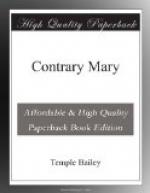“It’s no use, Poole. I’ve fought and fought. Father helped me. And I promised Con. And I thought that my love for Leila would make me strong. But there’s no use trying. I’ll be beaten. It is in the blood. I had an uncle who drank himself to death. And back of him there was a grandfather.”
They had been together for two days. Barry had agreed to Roger’s plans for a trip to the country, and now they were under the trees on the banks of one of the little brackish rivers which flow into the Chesapeake. They had fished a little in the early morning, then had brought their boat in, for Barry had grown tired of the sport. He wanted to talk about himself.
“It’s no use,” he said again; “it’s in the blood.”
Roger was propped against a tree, his hat off, his dark hair blown back from his fine thin face.
“Our lives,” he said, “are our own. Not what our ancestors make them.”
“I don’t believe it,” Barry said, flatly. “I’ve fought a good fight, no one can say that I haven’t. And I’ve lost. After this do you suppose that Mary will let me marry Leila? Do you suppose the General will let me marry her?”
“Will you let yourself marry her?”
Barry’s face flamed. “Then you think I’m not worthy?”
“It is what you think, Ballard, not what I think.”
Barry pulled up a handful of grass and threw it away, pulled up another handful and threw it away. Then he said, doggedly, “I’m going to marry her, Poole; no one shall take her away from me.”
“And you call that love?”
“Yes. I can’t live without her.”
Roger with his eyes on the dark water which slipped by the banks, taking its shadows from the darkness of the thick branches which bent above it said quietly, “Love to me has always seemed something bigger than that—it has seemed as if love—great love took into consideration first the welfare of the beloved.”
There was a long silence, out of which Barry said tempestuously, “It will break her heart if anything comes between us. I’m not saying that because am a conceited donkey. But she is such a constant little thing.”
Roger nodded. “That’s all the more reason why you’ve got to pull up now, Ballard.”
“But I’ve tried.”
“I knew a man who tried—and won.”
“How?” eagerly.
“I met him in the pine woods of the South. I was down there to recover from a cataclysm which had changed—my life. This man had a little shack next to mine. Neither of us had much money. We lived literally in the open. We cooked over fires in front of our doors. We hunted and fished. Now and then we went to town for our supplies, but most of our things we got from the schooner-men who drove down from the hills. My neighbor was married. He had a wife and three children. But he had come alone. And he told me grimly that he should never go back until he went back a man.”




